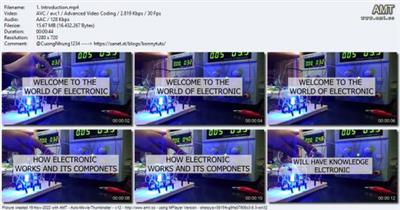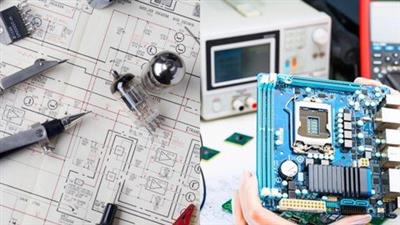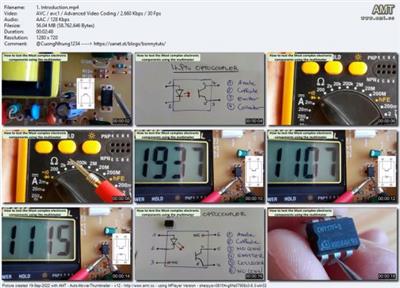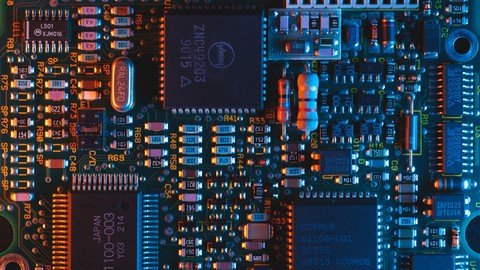
Basic Electronics 2023
Posted on 08 Sep 02:16 | by BaDshaH | 30 views
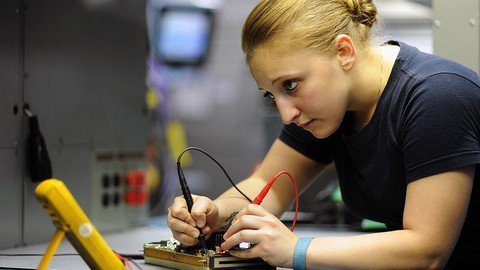
Published 9/2023
MP4 | Video: h264, 1280x720 | Audio: AAC, 44.1 KHz
Language: English | Size: 1.25 GB | Duration: 1h 42m
A Crash Course !
What you'll learn
learn about electronic components, their symbols, and functions within circuits
gain proficiency in analyzing electronic components and circuits using fundamental laws and techniques
develop skills in designing and prototyping electronic circuits on breadboards and troubleshooting circuit designs
The course will cover components and semiconductor devices and their applications
Learn practical electronics
Requirements
No specific requirements or prior experience necessary - this beginner-friendly course on basic electronics welcomes all interested learners.
Description
Course Description: Are you eager to demystify the world of electronics? Whether you're an aspiring engineer, a tech enthusiast, or someone simply curious about how the gadgets you use every day work, our "Basic Electronics - Crash Course" is your ticket to understanding the fundamental principles that power the modern world. Course Highlights: Foundations of Electronics: Dive into the very core of electronics by exploring concepts like voltage, current, resistance, and power. Understand Ohm's law and how it governs the behavior of electronic components. Electronic Components: Discover the key building blocks of electronic circuits, including resistors, capacitors, inductors, diodes, and transistors. Learn how to identify, use, and connect these components effectively. Circuit Analysis: Master the art of analyzing simple electronic circuits. You'll develop the skills to calculate voltages, currents, and power across different components using various circuit analysis techniques. Basic Circuit Design: Start designing your circuits! Explore different types of circuits such as voltage dividers, amplifiers, and oscillators. Get hands-on experience designing and building your own basic circuits. Semiconductor Devices: Uncover the magic of semiconductors. Learn about diodes and transistors, their types, functions, and applications in modern electronics. Digital Electronics: Enter the world of digital logic gates and binary arithmetic. Understand how digital circuits form the backbone of computers and modern technology. Practical Applications: Discover how basic electronics concepts apply to real-world applications. From simple gadgets to complex systems, you'll see how electronics is everywhere. Troubleshooting and Repair: Equip yourself with essential troubleshooting skills to identify and fix common electronic problems. Learn how to use multimeters and oscilloscopes effectively. Safety in Electronics: Safety is paramount when working with electronics. We'll cover best practices for safely handling electronic components and equipment. Project-Based Learning: Bring your newfound knowledge to life by working on practical projects. Build your own electronic creations, from LED flashers to basic audio amplifiers.
Overview
Section 1: Introduction
Lecture 1 Meet your instructor
Lecture 2 What is an Electronics?
Lecture 3 Know your Breadboard
Section 2: Resistor
Lecture 4 Resistor in electronics
Lecture 5 Resistor and its symbol
Lecture 6 How to read value of a resistor
Lecture 7 How to read value of a resistor - color code
Lecture 8 power rating of a resistor
Lecture 9 Ohm's law
Lecture 10 Variable resistor - potentiometer
Lecture 11 Resistors in series and parallel
Section 3: Capacitor
Lecture 12 What is a capacitor and what it does
Lecture 13 Parallel plate capacitor, symbol and operation
Lecture 14 Parallel plate capacitor formula
Section 4: voltage and current in electrical circuits
Lecture 15 what is a voltage? voltage source symbol and characteristics
Lecture 16 What is Current ?
Section 5: Semiconductor
Lecture 17 What is a semiconductor?
Lecture 18 Doping in Semiconductor
Lecture 19 Doping in Silicon - how to make p-type semiconductor
Lecture 20 p-n junction semiconductor
Lecture 21 energy band of semiconductor
Lecture 22 physics of pn junction semiconductor devices
Section 6: Diode
Lecture 23 p-n junction and diode - Semiconductor
Lecture 24 how do you know diode terminals?
Lecture 25 output characteristics of a pn junction semiconductor diode
Section 7: Practical Electronics
Lecture 26 Calculate and measure the value of the resistor using digital multimeter
Lecture 27 Do multiple test and measurement using digital multimeter - details
This course is intended for beginners and enthusiasts who want to learn about basic electronics and embark on their journey into the world of electronics systems. It is suitable for students, hobbyists, electronics enthusiasts, and anyone curious about how electronics work and how to use and apply it to develop practical applications. Whether you have a background in electronics or are completely new to the subject, this course will provide a solid foundation and practical knowledge to start working with electronics and undertake exciting projects.
Homepage
https://www.udemy.com/course/basic-electronics-p/
Download From Rapidgator
https://rapidgator.net/file/f8e3dbe0b1e278e4edcee87cc8f10d06
https://rapidgator.net/file/68063cc85643ee8138f7672ab7146200
Download From DDownload
https://ddownload.com/ev1x0qwf9x9i
https://ddownload.com/dkgoaojlk177
Related News
System Comment
Information
 Users of Visitor are not allowed to comment this publication.
Users of Visitor are not allowed to comment this publication.
Facebook Comment
Member Area
Top News
